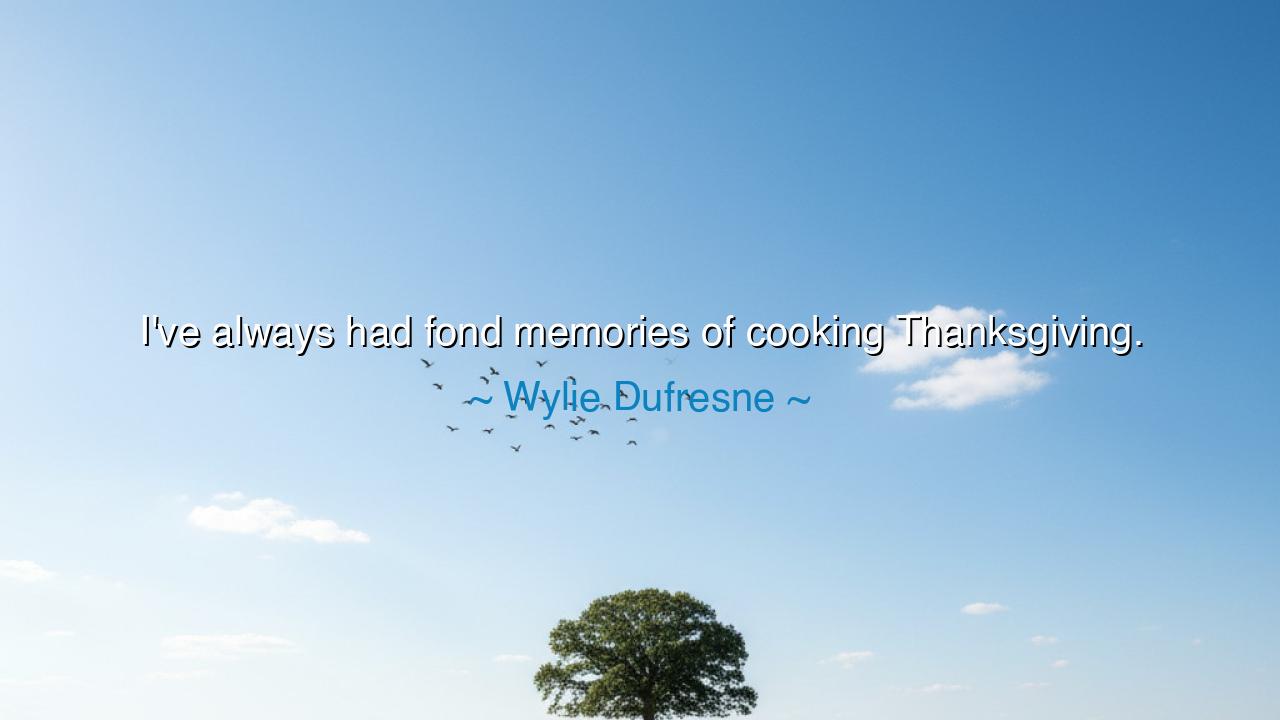
I've always had fond memories of cooking Thanksgiving.






In the words of Wylie Dufresne: “I’ve always had fond memories of cooking Thanksgiving.” At first, these words sound simple, yet within them lies the richness of tradition, the sacred weight of remembrance, and the eternal link between nourishment and love. For food is never only food—it is memory, it is belonging, it is the invisible thread that binds families across time. To speak of “fond memories” is to confess that the act of preparing the feast was more than labor; it was an offering, a ritual of care that nourished not only the body but also the soul.
The ancients themselves understood this truth. In every civilization, from Greece to Rome, from Israel to Egypt, the act of preparing a feast was seen as holy work. It was not only about filling bellies but about shaping community, about binding the living to the ancestors who had gone before. The feast was memory made visible. In Dufresne’s recollection, the Thanksgiving meal stands in that same line: the kitchen becomes an altar, and the food a prayer of gratitude, spoken not in words but in flavors.
Consider the Pilgrims’ first Thanksgiving, where survival itself was still uncertain. Their feast was not elaborate, but every dish bore the weight of gratitude. The preparing of food was an act of hope, the sharing of it an act of solidarity. That same spirit echoes centuries later in kitchens across the land: in the laughter, in the aromas, in the long hours of preparation that will never be forgotten. In the heart of the cook, these hours are transformed into “fond memories,” treasures that endure when the meal itself is long gone.
Dufresne, a master of the culinary arts, knew well the power of food beyond the plate. To recall Thanksgiving cooking is to recall not merely turkey and pie, but the presence of family, the rhythm of tradition, the joy of service. The kitchen becomes a place of both toil and triumph, where hands grow weary but hearts grow full. Each dish becomes a vessel of memory, carrying forward the essence of all who gathered and all who gave thanks.
There is something heroic in this remembrance, for the cook stands in the place of the provider, the one who transforms raw elements of the earth into a feast worthy of celebration. In the quiet hours of chopping and stirring, there is the echo of ancient wisdom: that to serve others with food is to participate in the oldest form of love. Thus, to say “fond memories” is to honor not only the joy of the feast but the nobility of the labor that created it.
The lesson is clear: the memories we treasure most are not always of grand speeches or great gifts, but of the humble acts of service that bind us together. Cooking, preparing, sharing—these are the true altars of Thanksgiving. What seems ordinary becomes sacred when done in love, and what seems fleeting becomes eternal when remembered.
Practical action lies before us: when the next holiday arrives, do not despise the labor of the kitchen, nor rush to escape it. Instead, see it as a chance to create memories, to bind generations, to embody gratitude with your hands as well as your words. Invite your children to join, so that they too may carry “fond memories” forward. For in the end, the feast passes, but the memory of love and labor endures like fire on the hearth of the soul.
Thus, Dufresne’s words, though plain, are filled with ancient weight. To cook Thanksgiving is not only to prepare a meal—it is to take part in an unbroken chain of gratitude, memory, and love. And the fondness he recalls is the same fondness we all may carry, if we choose to labor in love, and to give thanks not only with our lips, but with the work of our hands.






AAdministratorAdministrator
Welcome, honored guests. Please leave a comment, we will respond soon